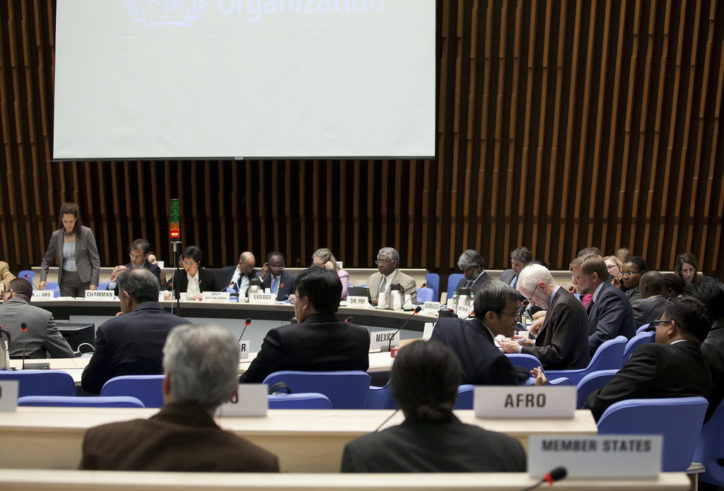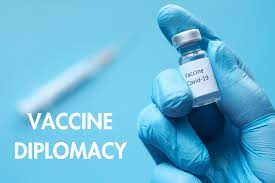
Last summer, while citizens in Western nations enjoyed a relative reprieve from some of the stricter Covid-19 restrictions, behind the scenes major negotiations were taking place which would determine the course of the pandemic. Wealthier nations raced to place vaccine pre-orders, hoping to be among the first to vaccinate their populations and fully lift restrictions.
Fast forward a year, and the majority of adults in Europe, the UK and the United States have received at least one dose of the vaccine, and restrictions are beginning to ease. In contrast, just 1% of citizens in low-income nations have received the first dose of their vaccine, and nations such as Tunisia and Indonesia, which had fared well in the first phase of the pandemic, have now been plunged into emergencies. With the immediate health crisis appearing to become more manageable in many advanced nations, at least for now, there are increasing calls for them to turn their attention to helping to vaccinate the rest of the world.
The Value of Vaccine Diplomacy
As the world grapples with the ongoing effects of the pandemic, Covid-19 vaccinations have revealed themselves to be the only pathway to recovery. Manufacturing and distributing these vaccines provides an opportunity for nations to generate soft power, asserting both their scientific prowess and their values on the international stage. It is an opportunity for nations to reward old friends and build new ones, highlighting the relative benefits of their political systems, markets and ideologies.
Serbia, for example, which is currently setting up Europe’s largest Confucius Institute to study Chinese culture and history, was among the first to receive Covid-19 vaccines from China, and bilateral donations by the EU have overwhelmingly been sent to its Balkan neighbours, in an effort to anticipate and rebuff Russia’s growing influence in the region.
In some cases, the coercive intentions behind Covid-19 vaccine donations and purchasing opportunities have been more overt, with China allegedly asking Honduras to end its recognition of Taiwan’s autonomy in return for vaccines and pressuring Ukraine to stop criticising its treatment of the Uighur people in Xinjiang. As a scarce resource, vaccine diplomacy has therefore cleaved on to existing geopolitical tensions, with China accusing Japan of ‘political manipulation’ and the United States of ‘interference in China’s internal affairs’, for donating vaccines to Taiwan.
China and Russia’s Early Dominance
While Western nations were criticised for hoarding vaccines in the early stages of vaccine development, China and Russia opted instead to delay vaccinating their own citizens, and instead gain an early lead in the global vaccine diplomacy race. While China has only donated 27 million Covid-19 vaccines so far, paling in comparison to the 500 million doses the United States pledged to donate last month, it has widely been regarded as the leader in vaccine diplomacy. In part this is due to the speed at which it began its vaccine diplomacy efforts, the wide geographic dispersion of its donations, covering 70 countries worldwide, and its ability to offer supplies quickly.
China’s leadership in this area has been cemented by its willingness to sell domestically produced vaccines to other nations, selling over 400 million Chinese-produced vaccines internationally, compared to the 44.6 million exported by the United States. By providing vaccine purchasing opportunities to nations unable to access Western vaccines due to the early orders made by advanced nations, China has been able to curry favour with lower-income nations without the economic cost of donating vaccines. Russia has followed closely behind, particularly in Africa, offering the African Union the opportunity to buy 300 million doses of the Sputnik V vaccine in February, alongside financing packages to enable countries to distribute these vaccines.
The two nations’ vaccine diplomacy hasn’t just been confined to developing nations. In the Spring, they identified opportunities presented by the slow rollout of the EU’s vaccine purchase and delivery scheme as a chance to make inroads amongst its member states, and to sow divide within the European Union. Hungary has publicly criticised the EU’s vaccine rollout, opting to inoculate its citizens with Russian and Chinese vaccines and taking an early lead in vaccinations as a result. Meanwhile, the Sputnik V vaccine has been at the centre of political disputes in Slovakia, with former Slovakian Prime Minister, Igor Matovic, forced to resign his post after secretly arranging to import 200,000 doses of Russia’s Sputnik V vaccine, a move he failed to gain approval from his coalition partners for.
Unfulfilled Promises and Changing Tides
However, as with the disillusionment with the PPE delivered by these nations in the first wave of the pandemic, Russia and China’s vaccines have also not been able to fulfil expectations.
A primary issue has been the efficacy of Chinese-manufactured vaccines, with hundreds of healthcare workers in Asian countries contracting Covid-19, despite being double vaccinated with the Sinovac vaccine. As a result, Thailand and Indonesia have both opted to give citizens a mix of vaccines, rather than two Sinovac vaccines, in a bid to increase efficacy and curb spiraling new outbreaks, while the UAE is offering third doses of the Sinopharm vaccine in an effort to boost immunity levels.
Similarly, while Russia has made much of its international Covid-19 vaccine sales and deliveries, just 24 per cent of the 1.14 million doses of the Sputnik V vaccine donated by Russia have been delivered. In Africa, Russia significantly overestimated African nations’ capacity to locally produce Sputnik V, and has been too slow to transfer the production knowledge to public health professionals in Africa, resulting in nations such as Egypt needing to delay the rollout of the Sputnik V vaccine to the second half of 2021. Further, the Sputnik V vaccine costs triple the price of the AstraZeneca vaccine, which is being provided to developing nations at a not-for-profit price, pricing out many nations, which are looking towards more affordable and effective Western alternatives and the COVAX scheme.
However, despite current setbacks, no doubt Russian and China’s vaccine diplomacy campaigns will continue at pace – just last week COVAX signed a deal to purchase 550 million Chinese Covid-19 vaccines, to mitigate delays in Western deliveries. Unless Western nations significantly increase their pledges of support and international access to their domestically produced vaccines, lower-income nations will have no choice but to rely on Russia and China – despite their many issues.
COVAX and Western Vaccine Diplomacy
It is true that Western nations have slowly increased their vaccine diplomacy efforts. As well as investing heavily and leading the creation of some of the most effective Covid-19 vaccines including the Pfizer-BioNTech, Moderna, AstraZeneca and Johnson & Johnson vaccines, and supporting local vaccine production, Western nations have been some of the biggest supporters of COVAX, both financially and in terms of vaccine contributions. Ahead of the G7 summit in June, G7 nations alone had contributed over 1 billion doses to COVAX through direct financing and doses. At the summit itself, G7 nations committed to providing a further one billion doses from summer 2021, with the United States alone committing to purchasing and contributing 500 million Pfizer vaccines to COVAX, while the UK committed to donating at least 100 million surplus vaccines.
Nonetheless, of the 870 million Covid-19 vaccines pledged at the G7 Summit in June, very few have been distributed, and the Western-led COVAX scheme has been plagued by supply challenges. After the pandemic situation in India reached a crisis point, the Serum Institute of India, which produces the Oxford-AstraZeneca vaccine, on which much of the COVAX scheme relies, ceased vaccine exports until the end of 2021. The COVAX distribution scheme has also received less than one per cent of the over 500 million doses pledged by wealthy countries, with the EU and the UK both yet to donate any of their pledged surplus vaccines to COVAX, while donations from the United States have only recently begun to trickle through.
In part, this reflects the ongoing precarity of Western nations’ domestic situations, with concerns over new variants, vaccine efficacy and the possible need for booster vaccines in the Autumn. This has led the UK to begin preparations to provide booster vaccinations to its most vulnerable in September, pending final advice from the Joint Committee on Vaccination and Immunisation, while the United States is currently in talks with Pfizer about the provision of booster vaccines. With Western leaders fearful of having to reimpose restrictions on their citizens in the future, the uncertainty around the next phases of the pandemic mean the issues with COVAX’s supply chain currently remain unresolved.
Where to Next?
With the United States sitting on millions of excess vaccines set to expire next month, and yet the COVAX scheme struggling with lack of donations, patience among developing nations and in international organisations is wearing thin. The World Health Organisation has called for a further 10 billion vaccines to reach global herd immunity, far and above the amounts currently being offered, with World Health Organisation Chief Tedros Adhanom Ghebreyesus criticising wealthier nations “greed” for driving vaccine inequity.
While Western nations have consistently resisted pressure from international organisations and developing countries to increase Covid-19 aid and support, with the disappointment of Chinese and Russian vaccine efforts, there is a clear opportunity for Western nations to step into the vacuum presented by the global scramble for Covid-19 vaccines. However, their ability and willingness to do so will no doubt be contingent on their confidence in the extent to which they have been able to get the virus under control domestically – a prospect for which there remains many unknowns.
If Western nations do decide to focus on accelerating the vaccination of the developing world, they will face a changing set of competitors in the field of vaccine diplomacy, as the challenges to vaccine equity shifts from vaccine production to vaccine purchasing. Where development of their own vaccines previously gave the United States, India and China the upper hand in vaccine diplomacy, financial and purchasing power now holds greater weight, enabling nations such as Saudi Arabia to get in on the action.
As demonstrated at the G7 Summit, the purchasing power and logistical heft of Western nations remains extremely strong when a spirit of collaboration prevails. Leaders clearly recognise the moral and a strategic imperative to tackle the two-tier system emerging between the global North and South, but continue to be cautious about the evolving needs of their domestic populations. It is only through working together to share the collective risk and responsibility to adequately service the COVAX scheme that the West will be able to counter the challenge posed by Russia and China, and stimulate the global economy.
For the UK, the need for balance is clear. While hospitalisations and deaths remain low, cases continue to rise and the so-called ‘pingdemic’ is challenging our ability to return to day-to-day life, necessitating caution and pragmatism from the UK government to ensure its own citizens are protected. Nonetheless, properly supporting lower income nations in a truly global health crisis is both a moral and strategic necessity, and must be taken seriously as a central focus of the Global Britain agenda.
23 Jul The Rise of Vaccine Diplomacy
Posted at 14:09h
in Diplomacy & Soft Power, UK Perspectives
by Evie Aspinall








